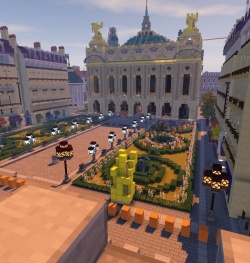The PCB wiki has now been archived and is read-only. |
Budapest
Budapest is a major city in the Creative 1.8 Map. It is owned by Estevaobuilder, Hywel, Leobhz, Tuzao and Jmvvana. It is the largest city on PCB, and is set in an European theme. Budapest is the capital city of Lucite and is home to many Lucitian relics, monuments and buildings. Budapest also held the Budapest Summer Olympics (2016) which occurred in late 2016. Budapest is regarded as one of PCB's most well known and successful cities.
|
Budapest Opera Hall | |
| Founder | EstevaoBuilder, Leobhz, Tuzao |
|---|---|
| Theme | European |
History
Latin-Abrcussian Era (756 BC (?) - 560 BC)
Budapest was originally founded as the city of Buda, beside the Abbacco river. The date of which the city was founded is uncertain. The original people who lived in the hamlet were the Abcrussians, whom came from Eastern Alga Sea and South Alga Sea. The Latin-Etruscan culture proliferated on this era, and during 710 BC (?) the Plateau of Buda was the acropolis of the city. It contained multiple temples, such as the Minerva Sanctuary and the Abcisse Forum (This last one was rebuilt in 1799). During this time, the government was based on a monarchy, as a vassal state of the Abcrussia-Copacabana Kingdom. The city had approximately 1000-2500 inhabitants at that time. However, in 560 BC, Abcrussia, capital of the Abcrussia-Copacabana Kingdom, was raided by Franks from the west, which resulted in the collapse of the Kingdom.
The Empire of Abbacco (560 BC - 116 DC)
After Buda gained its independence from Abcrussia, it became the capital of the Abbacco Empire. At that time, on the other side of the Abbacco river, a new city was founded to support Buda's growing population. It's name was Pest. During this time both cities consistently grew, and the population became over 50.000. This was a time of great prosperity for the region, because the Abbacco Empire was rich and able to make a lot of monuments to their people. The most notable of these new monuments is the Abbacco Amphitheater, which still exists today. In 110 DC, after more than 600 years of prosperity, the city was seized by the army of Copacabana, a new land recently converted to the new-growing religion, Catholicism.
Budapest Republic and the Crisis (116 - 987 (?))
After the fall of the Abbacco empire, a Hellenistic empire, all pagan temples were destroyed and the city entered a big crisis. However, the cities of Buda and Pest united to form a republic. At that time most of the trade was removed and a Holy State began to be built near the recently-united city. It was the Vatican. At the same time, the first Buda-Pest parliament began construction.
The Holy Empire of Copacabana (987 - 1333)
The Pope and the Holy Army of the Vatican occupied the Republic, which was absorbed into the Papal States of Copacabana. The era did not have many technological advancements, and the plague that hit the city on the year 1100, made the population fall from 60, 000 to 25, 000. After crusades to the East, the Pope gave the city independence, and his holy empire was dissolved.
| This article about a town is a stub. You can help PCBWiki by expanding it. |
The Foundation of Lucite (1341- Present) (True History)
Lucite was founded after the signing of the Budapest Pact during the early days of the creative map. Budapest would serve as the Capital. More can be read under the Lucite article.
